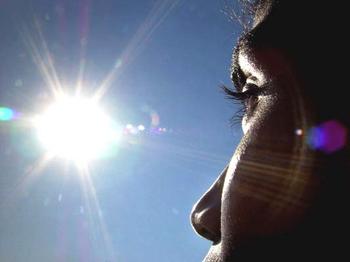
Have you ever thought about why you’re told to wear sunglasses when outdoors? It all comes down to UV protection. When you’re in the midst of too much UV light (found in sunlight), your eyes can get sunburned or even lead to serious eye conditions.
Sunburned eyes leads to what is known as photokeratitis. Working and spending time in areas with a high volume of UV light throughout your life can lead to more severe eye problems, including but not limited to cataracts. Knowing the potential impacts of UV light exposure, it’s vital to protect and shield your eyes from these rays.
Can Your Eyes Heal From Sun Damage?
In mild cases of photokeratitis your eyes can heal from sun damage to a certain degree. More often than not, photokeratitis diminishes within a short time frame–as long as you get out of the sun right away.
Watch out for these symptoms:
- An odd feeling like you have sand or another material in your eyes
- Bloodshot eyes
- Vulnerability to bright lights
- Watery eyes
While signs of eye damage, these side effects of sun exposure are often short term. Keep in mind that the more you’re out and about in the sun, you have a higher chance of getting more (and worse) symptoms, such as problems seeing. You may also have an increased likelihood of obtaining age-related macular degeneration (AMD) or cataracts down the line due to consistent exposure to UV rays without eye protection.
Cataracts and other eye diseases might not be so easy to get rid of. You’ll need to work with an eye doctor one-on-one to find the best treatment for sun damage to your eyes. Fortunately, Malik Eye Care houses specialists of these eye diseases that can prescribe the right treatment for your unique case.
Can Sun Glare Damage Your Eyes?
Photokeratitis, or snow blindness, can happen due to looking straight at the sun or its reflection on the beach, ice, lake, or snow. So yes, sun glare can damage your eyes.
Remember that sunlight isn’t the only type of UV light your eyes may come into with. If you self-tan, you likely use a tanning bed, which distributes UV light. Some forms of welding can also increase your exposure.
The bottom line is that any type of UV light can affect your eyes, both indoors and outdoors. If you work in a hazardous environment with a lot of UV radiation, consider UV-blocking sports goggles.
Generic eyeglasses with a UV-protective coating will work for the everyday job, while sunglasses that protect against at least 99 percent of UV rays are essential for your time outside. Make sure your sunglasses cover the sides of your eyes to deter damage in those areas.
Summary: Is Sun Damage to your Eyes Reversible?
Anytime you go outside, you risk getting sunburned eyes, also called photokeratitis. Photokeratitis can happen due to looking at the sun or its reflection. It may occur due to any number of hours on the beach or in the mountains, as it’s the amount of UV light your eyes take in that impacts you, rather than the time spent outdoors.
Fortunately, your eyes can heal from sun damage. If you have photokeratitis, you might just need a few days. However, keep in mind that more serious conditions, such as cataracts, can be harder to reverse. For those who suspect an eye disease or another severe eye issue, contact your eye doctor right away. Click here to schedule an appointment with one of our doctors.

